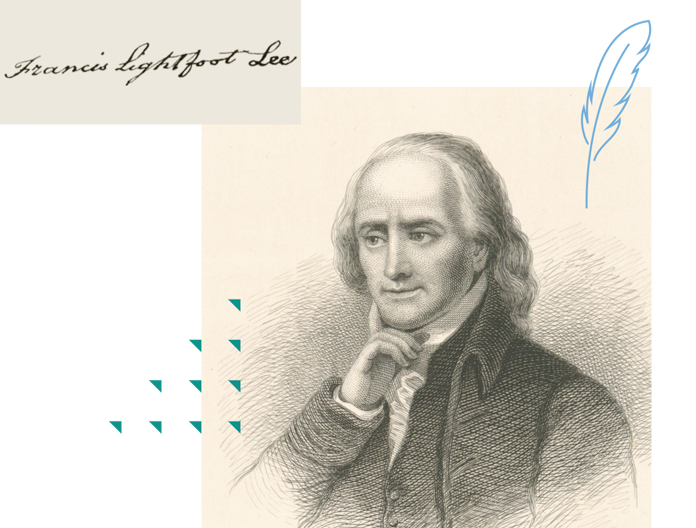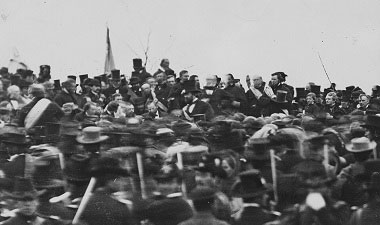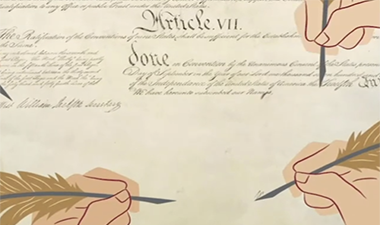Summary
Francis Lightfoot Lee served in the Second Continental Congress, where he shared his brother Richard Henry Lee’s view that independence was necessary.
Francis Lightfoot Lee | Signer of the Declaration of Independence
2:27
Biography
Francis Lightfoot Lee, or Frank as he was called, got his middle name from Francis Lightfoot, the best man at his parents’ wedding. He grew up in a large Virginia plantation home, Stratford Hall, along with five brothers and two sisters. Three generations before Frank was born, the Lee family had established its fortune selling furs, tobacco, and English-made goods and using the profits to purchase huge tracts of land in colonial Virginia.
Frank’s parents died when he was 16, and their property was divided among their sons. Frank inherited “Coton,” an estate in northern Virginia and, when the area was named Loudoun County, his brothers nicknamed him “Loudoun.” Later in life, he would build a new home, called “Menokin,” near Warsaw, Virginia.
Frank’s temperament set him apart from his controversy-prone brothers, Richard Henry and Arthur. Arthur described him as “calmness and philosophy itself” although his politics were as radical as theirs. By 1758, he and brothers Philip and Richard Henry had formed a family voting bloc in Virginia’s colonial government.
And, despite his philosophical bent, in 1766, 32-year-old Frank signed Richard Henry’s Westmoreland Resolutions that challenged the King’s authority and condemned the Stamp Act. These resolutions, binding its signers to protect any colonist deprived of liberty or property by the Stamp Act, were among the first seditious declarations against the Crown. In 1773, as British taxing policies prompted more resistance in the colonies, Frank joined his brother on Virginia’s Committee of Correspondence.
In 1775, Francis was elected to serve in the Second Continental Congress. By then, he shared Richard’s certainty that independence was the only course of action for the colonies. On June 7, 1776, when Richard presented his resolution that the colonies “are, and of right ought to be, free and independent States,” Francis wholeheartedly agreed. When Richard Henry was called back to Virginia to help write its constitution, Francis kept him abreast of developments in the Congress: “This day the resolve for independency was considered & agreed to in Comtee of the whole…Tomorrow it will pass the house with the concurrence of S. Carolina…if our people keep up their spirits, & are determined to be free; whatever advantages the Enemy may gain over us This summer & fall; we shall be able to deprive them of it in the winter…Yet I confess I am uneasy, least any considerable losses on our side shou’d occasion such a panic in the Country, as to induce a submission.” Francis added a note of frustration with the continuing debate in,Congress over independence, telling his brother, “[W]hen all our attention, every effort shou’d be to oppose the Enemy, we are disputing about Government & independence.”
Early that July, the Declaration of Independence was written, and Francis Lightfoot Lee eagerly signed it. In 1777, with the Continental Army freezing at Valley Forge, Lee became the chair of a special congressional committee to support Washington’s troops. He remained in Congress until 1779 when he returned to his wife, Rebecca, and their home in Richmond County. Lee died of pleurisy in January 1797, four days after his wife passed away. The couple had no children, so Lee left his sizeable estate to Richard Henry’s second son Ludwell who shared his uncle’s interest in politics.
Although suspicion and scandal followed his brother Arthur and political enemies plagued Richard Henry Lee, Francis was never controversial. The 19th century writer, Mark Twain [Samuel Clemens] wrote of him: “He did no brilliant things, he made no brilliant speeches; but the enduring strength of his participation was manifest, his fearlessness in confronting perilous duties… was patent to all, the purity of his motives was unquestioned, his unpurchasable honor and uprightness were unchallenged.” Perhaps the epitaph offered by Lee’s niece Nancy Shippen put it best: “Thou sweetest of all the Lee race / That ever adorned our shore.”








